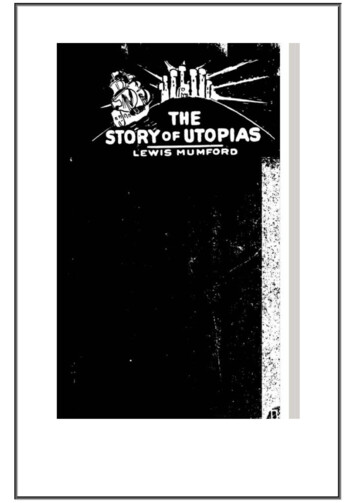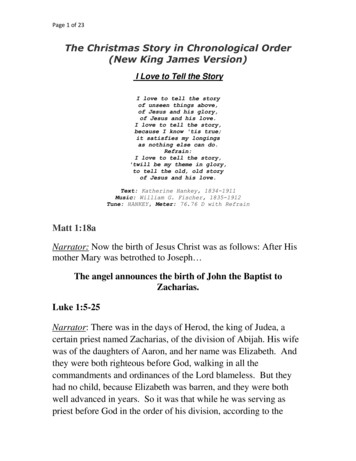
Transcription
THE STORY OFUTOPIASBYLEWIS MUMFORDWITH AN INTRODUCTIONBYHENDRIK WILLEM VAN LOON"A Map of the World that does not include Utopia is notworth even glancing at. . . ."NEW YORK: BONI AND LIVERIGHT, INC.ORIGINALLY PUBLISHED IN 1922
The Story of Utopias By Lewis Mumford.This web edition created and published by Global Grey 2013.GLOBAL GREYNOTHING BUT E-BOOKS
TABLE OF CONTENTSACKNOWLEDGMENTSINTRODUCTIONCHAPTER ONE: How the will-to-utopia causes men to live in two worlds,and how, therefore, we re-read the Story of Utopias—the other half of theStory of Mankind.CHAPTER TWO: How the Greeks lived in a New World, and utopiaseemed just round the corner. How Plato, in the Republic, is chieflyconcerned with what will hold the ideal city togetherCHAPTER THREE: How something happened to utopia between Platoand Sir Thomas More; and how utopia was discovered again, along with theNew WorldCHAPTER FOUR: How the new Humanism of the Renascence brings uswithin sight of Christianopolis; and how we have for the first time a glimpseof a modern utopiaCHAPTER FIVE: How Bacon and Campanella, who have a greatreputation as utopians, are little better than echoes of the men who wentbefore themCHAPTER SIX: How something happened in the eighteenth century whichmade men "furiously to think," and how a whole group of utopias sprangout of the upturned soil of industrialismCHAPTER SEVEN: How some utopians have thought that a goodcommunity rested at bottom on the right division and use of land; and whatsort of communities these land-animals projectedCHAPTER EIGHT: How Étienne Cabet dreamed of a new Napoleoncalled Icar, and a new France called Icaria; and how his utopia, with thatwhich Edward Bellamy shows us in Looking Backward, gives us a hint ofwhat machinery might bring us to if the industrial organization werenationalizedCHAPTER NINE: How William Morris and W. H. Hudson renew theclassic tradition of utopias; and how, finally, Mr. H. G. Wells sums up andclarifies the utopias of the past, and brings them into contact with the worldof the present
CHAPTER TEN: How the Country House and Coketown became theutopias of the Modern Age; and how they made the world over in theirimageCHAPTER ELEVEN: How we reckon up accounts with the one-sidedutopias of the partisansCHAPTER TWELVE: How the half-worlds go, and how eutopia maycome; and what we need before we can build Jerusalem in any green andpleasant landBIBLIOGRAPHY
1The Story of Utopias By Lewis MumfordACKNOWLEDGMENTSThe first outline of this book dates back ten years; and since then Ihave woven it and rewoven it in my mind. The actual work ofcomposition was started by a suggestion from Mr. Van Wyck Brooks;and without Mr. Brooks’ encouragement I should perhaps never havebegun or carried through the task. The general background of ideashas been heavily colored by my contacts with Professor PatrickGeddes, through his books and by correspondence; and I owe a debt tohim I have not always been able to acknowledge in direct reference orin quotation marks. I take the opportunity here to express the heartygratitude which might otherwise have been conveyed in the morearchaic form of a dedication.In the revision of the MS. I have been blessed with the generous adviceand criticism of a number of friends; in particular, Mr. ClarenceBritten, Mr. Herbert Feis, Mr. Geroid Robinson, and Miss SophiaWittenberg, each of whom performed a unique service. To Messrs.Victor Branford and Alexander Farquharson of the Sociological Societyof Great Britain I am indebted for many pertinent suggestions. Mythanks are also due to the editors of The Freeman for permission touse extracts from two articles: Towards a Humanist Synthesis andBeauty and the Picturesque. Finally, Mr. Hendrik van Loon's friendlyinterest calls for a departing beam of gratitude.LEWIS MUMFORD.New York City,July, 1922.www.globalgrey.co.uk
2The Story of Utopias By Lewis MumfordINTRODUCTIONIT is a sunny day and I am sitting on the top of a mountain. Until thismorning, it had been the mountain of a fairy story that was twentycenturies old.Now, it is a mighty hill and I can feel its warm coat of white reindeermoss, and if I were willing to stretch out my hand, I could pluck the redberries that are in full bloom.A hundred years from now it will be gone.For it is really a large chunk of pure iron, dumped by a playfulProvidence in the very heart of Lapland.Do you remember an old tale of Norse mythology? How somewhere,far in the north, there stood a high peak of iron, which was a hundredmiles high and a hundred miles wide? And how a little bird came to itonce every thousand years to sharpen its beak? And how, when themountain was gone, a single second of all eternity would have passedby?I heard it told as a child.I remembered it always, and I told it to my own boys when they beganto learn history. It seemed the invention of some prehistoric HansChristian Andersen. It belonged to the imaginary scenery of ourdreams.The story has come true, and I have found my old mountain where Ileast expected it.To make the cycle of coincidence perfect, this hill was named after abird. The Lapp, with a fine sense of sound, called the ptarmigan "Kiru."www.globalgrey.co.uk
3The Story of Utopias By Lewis MumfordKirunavaara no longer hears the shrill "kiru-kiru" of rising birds.Twice a day it listens to the terrific detonation of half a hundredcharges of dynamite.Then it is shaken by the little trains which carry the rock to the valley.In the evening, it sees the lights of the large electric engines whichhoist the valuable metal across the arctic wilderness of LakeTornotrask.Two months later, the ore has been melted and worked into thosemodern articles of trade which go by the name of bridges andautomobiles and ships and apartment houses and a thousand otherthings which once promised to elevate man from the ranks of thebeasts of burden.What has become of that promise, the survivors of the last eight yearsknow with great if gruesome accuracy.Even the humble Lapp has heard of the great upheaval, and has askedwhy the white people should kill each other when the whole worldwas full of reindeer and when God has given us the hills and the plainsso that forever there should be food enough for the long days ofsummer and the longer nights of the endless winter.But the ways of the Lapp are not the ways of the white man. Thesesimple followers of a pure and much undiluted nature follow the eventenor of their ways as their ancestors did, five and ten thousand yearsago.We, on the other hand, have our engines and we have our railroadtrains and we have our factories and we cannot get rid of these ironwww.globalgrey.co.uk
4The Story of Utopias By Lewis Mumfordservants without destroying the very basis of our civilization. We mayhate these ungainly companions, but we need them. In time to come,we shall know how to be their masters. Then Plato shall give us arevised Republic where all the houses are heated by steam and whereall the dishes are washed by electricity.We are not suffering from too much machinery, but from too little. Forlet there be enough iron servants and more of us shall be able to sit onthe tops of mountains and stare into the blue sky and waste valuablehours, imagining the things that ought to be.The Old Testament used to call such people prophets. They raisedstrange cities of their hearts' delight, which should be basedexclusively upon righteousness and piety. But the greatest of all theirprophets the Jews killed to make a Roman holiday. The Greeks knewsuch wise men as philosophers. They allowed them great freedom andrejoiced in the mathematical precision with which their intellectualleaders mapped out those theoretical roads which were to leadmankind from chaos to an ordered state of society.The Middle Ages insisted with narrow persistence upon the Kingdomof Heaven as the only possible standard for a decent Christian Utopia.They crushed all those who dared to question the positive existence ofsuch a future state of glory and content. They built it of stone andprecious metals, but neglected the spiritual fundament. And so itperished.The sixteenth and seventeenth centuries fought many bitter wars todecide the exact nature of a whitewashed Paradise, erected upon thecrumbling ruins of the mediæval church.www.globalgrey.co.uk
5The Story of Utopias By Lewis MumfordThe eighteenth century saw the Promised Land lying just across theterrible bulwark of stupidity and superstition, which a thousand yearsof clerical selfishness had erected for its own protection and safety.There followed a mighty battle to crush the infamy of ignorance andbring about an era of well-balanced reason.Unfortunately, a few enthusiasts carried the matter a trifle too far.Napoleon, realist-in-chief of all time, brought the world back to thecommon ground of solid facts.Our own generation drew the logical conclusion of the Napoleonicpremises.Behold the map of Europe and see how well we have wrought. Foralas! this world needs Utopias as it needs fairy stories. It does notmatter so much where we are going, as long as we are makingconsciously for some definite goal. And a Utopia, however strange orfanciful, is the only possible beacon upon the uncharted seas of thedistant future.It encourages us in our efforts. Sometimes the light is hidden by theclouds and for a moment we may lose our way. Then the faint lightonce more breaks through the darkness and we press forward withnew courage.And when life is dull and meaningless (the main curse of all existence)we find consolation in the fact that a hundred yearswww.globalgrey.co.uk
6The Story of Utopias By Lewis Mumfordfrom now, our children shall reach the shore for which we were boundwhen we ourselves left the bridge and were lowered to the peacefulbottom of the ocean.And now the sun has gone down and a chill wind blows fromKebnekajse, where the wild geese of little Nils Holgerson live amidstthe endless silence of the eternal snow. Soon the top shall be hidden inthe mist and I shall have to find my way back by the noise of the steamshovels, plying their elephantine trade at the foot of the first terrace.The mountain of my fairy story once more a will be the profitableinvestment of a Company of Iron-mongers.But that does not matter.Lewis Mumford, for whom I am writing this, will understand what Imean.And I shall be content.Kiruna, Lapland,14 Sept., 1922.www.globalgrey.co.uk
7The Story of Utopias By Lewis MumfordCHAPTER ONE: How the will-to-utopia causes mento live in two worlds, and how, therefore, we re-read theStory of Utopias—the other half of the Story ofMankind.1UTOPIA has long been another name for the unreal and the impossible.We have set utopia over against the world. As a matter of fact, it is ourutopias that make the world tolerable to us: the cities and mansionsthat people dream of are those in which they finally live. The more thatmen react upon their environment and make it over after a humanpattern, the more continuously do they live in utopia; but when thereis a breach between the world of affairs and the overworld of utopia,we become conscious of the part that the will-to-utopia has played inour lives, and we see our utopia as a separate reality.It is the separate reality of utopia that we are going to explore in thecourse of this book—Utopia as a world by itself, divided into idealcommonwealths, with all its communities clustered into proud cities,aiming bravely at the good life.This discussion of ideal commonwealths gets its form and its colorfrom the time in which it is written. Plato's Republic dates from theperiod of social disintegration which followed the Peloponnesian War;and some of its mordant courage is probably derived from thehopelessness of conditions that came under Plato's eye. It was in themidst of a similar period of disorder and violence that Sir ThomasMore laid the foundations for his imaginary commonwealth: Utopiawas the bridge by which he sought to span the gap between the oldorder of the Middle Age, and the new interests and institutions ofthe Renaissance.In presenting this history and criticism of utopias we are perhapsbeing pulled by the same interests that led Plato and More onwards,for it is only after the storm that we dare to look for the rainbow. Ourfall into a chasm of disillusion has stimulated us to discuss in a morethorough way the ultimate goods, the basic aims, the whole conceptionof the "good life" by which, in modern times, we have been guided. Inthe midst of the tepid and half-hearted discussions that continue towww.globalgrey.co.uk
8The Story of Utopias By Lewis Mumfordarise out of prohibition laws and strikes and "peace" conferences let usbreak in with the injunction to talk about fundamentals—considerUtopia!2Man walks with his feet on the ground and his head in the air; and thehistory of what has happened on earth—the history of cities andarmies and of all the things that have had body and form—is only onehalf the Story of Mankind.In every age, the external scenery in which the human drama has beenframed has remained pretty much the same. There have beenfluctuations in climate and changes in terrain; and at times a greatcivilization, like that of the Mayas in Central America, has arisen wherenow only a thick net of jungle remains; but the hills around Jerusalemare the hills that David saw; and during the historic period thedrowning of a city in the Netherlands or the rise of a shifting bank ofreal estate along the coast of New Jersey is little more than thewearing off of the paint or a crack in the plaster. What we call thematerial world constantly changes, it goes without saying: mountainsare stript of trees and become wastes, deserts are plowed with waterand become gardens. The main outlines, however, hold their ownremarkably well; and we could have travelled better in Roman dayswith a modern map than with the best chart Ptolemy could haveoffered us.If the world in which men live were the world as it is known to thephysical geographer, we should have a pretty simple time of it. Wemight follow Whitman's advice, and live as the animals, and stopwhining for all time about our sins and imperfections.What makes human history such an uncertain and fascinating story isthat man lived in two worlds—the world within and the worldwithout—and the world within men's heads has undergonetransformations which have disintegrated material things with thepower and rapidity of radium. I shall take the liberty of calling thisinner world our idolum (ido -lum) or world of ideas. The word "ideas"is not used here precisely in the ordinary sense. I use it rather to standfor what the philosophers would call the subjective world, what thetheologians would perhaps call the spiritual world; and I mean toinclude in it all the philosophies, fantasies, rationalizations,www.globalgrey.co.uk
9The Story of Utopias By Lewis Mumfordprojections, images, and opinions in terms of which people patterntheir behavior. This world of ideas, in the case of scientific truths, forexample, sometimes has a rough correspondence with what peoplecall the world; but it is important to note that it has contours of its ownwhich are quite independent of the material environment.Now the physical world is a definite, inescapable thing. Its limits arenarrow and obvious. On occasion, if your impulse is sufficiently strong,you can leave the land for the sea, or go from a warm climate into acool one; but you cannot cut yourself off from the physicalenvironment without terminating your life. For good or ill, you mustbreathe air, eat food, drink water; and the penalties for refusing tomeet these conditions are inexorable. Only a lunatic would refuse torecognize this physical environment; it is the substratum of our dailylives.But if the physical environment is the earth, the world of ideascorresponds to the heavens. We sleep under the light of stars that havelong since ceased to exist, and we pattern our behavior by ideas whichhave no reality as soon as we cease to credit them. Whilst it holdstogether this world of ideas—this idolum—is almost as sound, almostas real, almost as inescapable as the bricks of our houses or the asphaltbeneath our feet. The "belief" that the world was fiat was once upon atime more important than the "fact" that it was round; and that beliefkept the sailors of the medieval world from wandering out of sight ofland as effectively as would a string of gunboats or floating mines. Anidea is a solid fact, a theory is a solid fact, a superstition is a solid factas long as people continue to regulate their actions in terms of theidea, theory, or superstition; and it is none the less solid because it isconveyed as an image or a breath of sound.3This world of ideas serves many purposes. Two of them bear heavilyupon our investigation of utopia. On one hand the pseudoenvironment or idolum is a substitute for the external world; it is asort of house of refuge to which we flee when our contacts with "hardfacts" become too complicated to carry through or too rough to face.On the other hand, it is by means of the idolum that the facts of theeveryday world are brought together and assorted and sifted, and anew sort of reality is projected back again upon the external world.One of these functions is escape or compensation; it seeks anwww.globalgrey.co.uk
10The Story of Utopias By Lewis Mumfordimmediate release from the difficulties or frustrations of our lot. Theother attempts to provide a condition for our release in the future. Theutopias that correspond to these two functions I shall call the utopiasof escape and the utopias of reconstruction. The first leaves theexternal world the way it is; the second seeks to change it so that onemay have intercourse with it on one's own terms. In one we buildimpossible castles in the air; in the other we consult a surveyor and anarchitect and a mason and proceed to build a house which meets ouressential needs; as well as houses made of stone and mortar arecapable of meeting them.4Why, however, should we find it necessary to talk about utopia and theworld of ideas at all? Why should we not rest secure in the bosom ofthe material environment, without flying off into a region apparentlybeyond space and time? Well, the alternative before us is not whetherwe shall live in the real world or dream away our time in utopia; formen are so constituted that only by a deliberate discipline—such asthat followed by a Hindu ascetic or an American business man—canone or the other world be abolished from consciousness. The genuinealternative for most of us is that between an aimless utopia of escapeand a purposive utopia of reconstruction. One way or the other, itseems, in a world so full of frustrations as the "real" one, we mustspend a good part of our mental lives in utopia.Nevertheless this needs a qualification. It is plain that certain types ofpeople have no need for private utopias and that certain communitiesseem to be without them. The savages of the Marquesas whomHermann Melville described seem to have had such a jolly andcomplete adjustment to their environment that, except for the raids ofhostile tribes—and this turned out to be chiefly sport which onlywhetted their appetites for the feast that followed—everything neededfor a good life at the South Sea level could be obtained by direct attack.The Marquesans had no need to dream of a happier existence; theyhad only to grab it.At times, during childhood perhaps, life has the same sort ofcompleteness; and without doubt there are many mature people whohave manufactured out of their limitations a pretty adequate responseto a narrow environment; and have let it go at that. Such people feel noneed for utopia. As long as they can keep their contacts restricted, onlywww.globalgrey.co.uk
11The Story of Utopias By Lewis Mumforda deliberate raid from the outside world would create such a need.They are like the sick man in the parable of the Persian poet, whoseonly desire was that he might desire something; and there is noparticular reason to envy them. People who will not venture out intothe open sea pay the penalty of never having looked into the brighteyes of danger; and at best they know but half of life. What such folkmight call the good life is simply not good enough. We cannot besatisfied with a segment of existence, no matter how safely we may beadjusted to it, when with a little effort we can trace the complete circle.But there have been few regions, few social orders, and few people inwhich the adjustment has not been incomplete. In the face of perpetualdifficulties and obstructions—the wind and the weather and theimpulses of other men and customs that have long outlived their use—there are three ways, roughly, in which a man may react. He may runaway. He may try to hold his own. He may attack. Looking around atour contemporaries who have survived the war, it is fairly evident thatmost of them are in the first stage of panic and despair. In aninteresting article on The Dénouement of Nihilism, Mr. EdwardTownsend Booth characterized the generation born in the late eightiesas suffering a complete paralysis of will, or else, "if any initiativeremains to them, they emigrate to Europe or the South Sea Islands, orcrawl off into some quiet corner of the United States—but most ofthem continue where they were stricken in a state of living death."(The Freeman.)Speaking more generally, running away does not always mean aphysical escape, nor does an "attack" necessarily mean doingsomething practical "on the spot." Let us use Dr. John Dewey'sillustration and suppose that a man is denied intercourse with hisfriends at a distance. One kind of reaction is for him to "imagine"meeting his friends, and going through, in fantasy, a whole ritual ofmeeting, repartee, and discussion. The other kind of reaction, as Dr.Dewey says, is to see what conditions must be met in order to cementdistant friends, and then invent the telephone. The so-called extrovert,the type of man who has no need for utopias, will satisfy his desire bytalking to the nearest human being. ("He may try to hold his own.")But it is fairly plain that the extrovert, from the very weakness andinconstancy of his aims, is incapable of contributing anything but"good nature" to the good life of the community; and in his hands bothart and invention would probably come to an end.www.globalgrey.co.uk
12The Story of Utopias By Lewis MumfordNow putting aside the extrovert, we find that the two remaining typesof reaction have expressed themselves in all the historic utopias. It isperhaps well that we should see them first in their normal, everydaysetting, before we set out to explore the ideal commonwealths of thepast.More or less, we have all had glimpses of the utopia of escape: it israised and it collapses and it is built up again almost daily. In the midstof the clanking machinery of a paper factory I have come across amoving picture actress's portrait, stuck upon an inoperative part of themachine; and it was not hard to reconstruct the private utopia of theman who minded the levers, or to picture the world into which he hadfled from the roar and throb and muck of the machinery about him.Who has not had that utopia from the dawn of adolescence onwards—the desire to possess and be possessed by a beautiful woman?Perhaps for the great majority of men and women that small, privateUtopia is the only one for which they feel a perpetual, warm interest;and ultimately every other utopia must be translatable to them insome such intimate terms. Their conduct would tell us as much if theirwords did not confess it. They leave their bleak office buildings andtheir grimy factories, and night after night they pour into the cinematheater in order that they may live for a while in a land populated bybeautiful, flirtatious women and tender, lusty men. Small wonder thatthe great and powerful religion founded by Mahomet puts that utopiain the very foreground of the hereafter! In a sense, this is the mostelementary of utopias; for, on the interpretation of the analyticalpsychologist, it carries with, it the deep longing to return to andremain at rest in the mother's womb—the one perfect environmentwhich all the machinery and legislation of an eager world has neverbeen able to reproduce.In its most elemental state, this utopia of escape calls for a completebreach with the butcher, the baker, the grocer, and the real, limited,imperfect people that flutter around us. In order to make it moreperfect, we eliminate the butcher and baker and transport ourselves toa self-sufficient island in the South Seas. For the most part, of course,this is an idle dream, and if we do not grow out of it, we must at anyrate thrust other conditions into it; but for a good many of us, idlenesswithout a dream is the only alternative. Out of such fantasies of blissand perfection, which do not endure in real life even when theyoccasionally bloom into existence, our art and literature have verywww.globalgrey.co.uk
13The Story of Utopias By Lewis Mumfordlargely grown. It is hard to conceive of a social order so complete andsatisfactory that it would rob us of the necessity of having recourse,from time to time, to an imaginary world in which our sufferings couldbe purged or our delights heightened. Even in the great idyll paintedby William Morris, women are fickle and lovers are disappointed; andwhen the "real" world becomes a little too hard and too sullen to face,we must take refuge, if we are to recover our balance, into anotherworld which responds more perfectly to our deeper interests anddesires—the world of literature.Once we have weathered the storm, it is dangerous to remain in theutopia of escape; for it is an enchanted island, and to remain there is tolose one's capacity for dealing with things as they are. The girl who hasfelt Prince Charming's caresses too long will be repulsed by the clumsyembraces of the young man. who takes her to the theater and wondershow the deuce he is going to pay the rent if they spend more than aweek on their honeymoon. Moreover, life is too easy in the utopia ofescape, and too blankly perfect—there is nothing to sharpen yourteeth upon. It is not for this that men have gone into the jungle to huntbeasts and have cajoled the grasses and roots to be prolific, and havedefied, in little open boats, the terror of the wind and sea. Our dailydiet must have more roughage in it than these daydreams will give usif we are not to become debilitated.In the course of our journey into utopia we shall remain a little whilein these utopias of escape; but we shall not bide there long. There areplenty of them, and they dot the waters of our imaginary world as theislands that Ulysses visited dotted the Ægean Sea. These utopiashowever belong to the department of pure literature, and in thatdepartment they occupy but a minor place. We could dispense withthe whole lot of them, hag and baggage, in exchange for another AnnaKarenin or The Brothers Karamazov.The second kind of utopia which we shall encounter is the utopia ofreconstruction.The first species represents, the analytical psychologist would tell us, avery primitive kind of thinking, in which we follow the direction of ourdesires without taking into account any of the limiting conditionswhich we should have to confront if we came back to earth and tried torealize our wishes in practical affairs. It is a vague and messy andlogically inconsequent series of images which color up and fade, whichwww.globalgrey.co.uk
14The Story of Utopias By Lewis Mumfordexcite us and leave us cold, and which—for the sake of the respect ourneighbors have for our ability to add a ledger or plane a piece ofwood—we had better confine to the strange box of records we call ourbrain.The second type of utopia may likewise be colored by primitivedesires and wishes; but these desires and wishes have come to reckonwith the world in which they seek realization. The utopia ofreconstruction is what its name implies: a vision of a reconstitutedenvironment which is better adapted to the nature and aims of thehuman beings who dwell within it than the actual one; and not merelybetter adapted to their actual nature, but better fitted to their possibledevelopments. If the first utopia leads backward into the utopian's ego,the second leads outward—outward into the world.By a reconstructed environment I do not mean merely a physical thing.I mean, in addition, a new set of habits, a fresh scale of values, adifferent net of relationships and institutions, and possibly—foralmost all utopias emphasize the factor of breeding—an alteration ofthe physical and mental characteristics of the people chosen, througheducation, biological selection, and so forth. The reconstructedenvironment which all the genuine utopians seek to contrive is areconstruction of both the physical world and the idolum. It is in thisthat the utopian distinguishes himself from the practical inventor andthe industrialist. Every attempt that has been made to domesticateanimals, cultivate plants, dredge rivers, dig ditches, and in moderntimes, apply the energy of the sun to mechanical instruments, has beenan effort to reconstruct the environment; and in many cases thehuman advantage has been plain. It is not for the utopian to despisePrometheus who brought the fire or Franklin who captured thelightning. As Anatole France says: "Without the Utopians of othertimes, men would still live in caves, miserable and naked. It wasUtopians who traced the lines of the first city. . . . Out of generousdreams come beneficial realities. Utopia is the principle of all progress,and the essay into a better future."Our physical reconstructions however have been limited; they havetouched chiefly the surfaces of things. The result is that people live in amodern physical environment and carry in their minds an oddassortment of spiritual relics from almost every other age, f
May 24, 2020 · I heard it told as a child. I remembered it always, and I told it to my own boys when they began to learn history. It seemed the invention of some prehistoric Hans Christian Andersen. It belonged to the imaginary scenery of our dreams. The story has come true, an










